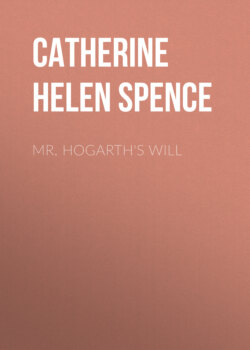Читать книгу Mr. Hogarth's Will - Catherine Helen Spence - Страница 12
На сайте Литреса книга снята с продажи.
Chapter VI. A Bundle Of Old Letters
ОглавлениеTable of Contents
Elsie had a headache when Francis came to take possession of his new home, and scarcely made her appearance; but Jane, who felt none of her sister's shrinking from him, showed him over the house, and told him how it had been managed, hoped he would keep the present servants, and particularly recommended to his care the gardener, who, though rather superannuated and rheumatic, had been forty years in the service of the family, and understood the soil and the treatment of it very well.
He was not only glad to hear what she said, but was resolved to be guided by it, and took a memorandum of her poor pensioners, that they, at least, should not suffer by Mr. Hogarth's will.
Then she walked with him over the grounds, and pointed out what improvements her uncle had made, and what more he had contemplated making. She was rather deficient in taste for rural beauty. She loved Cross Hall because it was her home, and because she had been happy there, rather than because she fully appreciated the loveliness of the situation and the prospect. Her cousin, townsman as he was, had far more natural taste. It was romantically situated, and the grounds were beautifully laid out; there were pretty hamlets in the distance, gentlemen's country seats embowered in trees, green cornfields, merry brooks, and winding valleys. Francis' eyes and heart were filled with the exceeding beauty of the landscape.
"You must be very sorry to leave all this Jane," he said.
"I believe that is the least of my troubles. I am more sorry to leave these;" and she led him to the stables, and showed him the two beautiful horses she and her sister had been accustomed to ride. "You will be kind to them for our sakes, and the dogs, too. I am—we are both—very concerned to part with the dogs."
"Should you not like to take any of them with you?" said Francis, eagerly.
"No, no; dogs such as these would be a nuisance in a crowded little room in Edinburgh, and I do not think they would like such a life, for their own part. You will take better care of them than we could possibly do. But I forget: you have, perhaps, as little affection for animals as I have taste for scenery."
"I am not naturally fond of pets—which is rather strange; for my solitary life should have made me attach myself to the lower animals. But perhaps I am not naturally affectionate. I must cultivate this deficient taste, however; and be assured that anything you have loved will always be cherished by me; and every wish that you may express, or that I can even guess at, that I am allowed to gratify, I will be only too happy to do so. It has been a strange and stormy introduction we have had to each other; but I am so grateful to you for not hating me, that I chafe still the more at the cruel way in which my hands are tied. I have consulted several eminent lawyers in the hope of being enabled to overturn my father's will, but without success. If a man is not palpably mad he may make as absurd a settlement of his own property as he pleases; and your assertion of your uncle's peculiar opinions tends to support the validity of the testament. Though no one thinks that the disposition of the money will serve the end Mr. Hogarth intended, yet he believed it would, and the spirit and intention of the will must be carried out. Oh, my father! why did you not give me a little love in your lifetime instead of this cursed money after your death?"
"Cousin," said Jane cheerfully, "I believe you will make a good use of this money. As my uncle says, you have served well, and should be able to rule justly and kindly. I do not think so much about the improvement of the property by your taste as of the care you will take of the condition of the people upon it. This last month has been a hard, but a useful school to me. I have thought more of the real social difficulties of this crowded country than ever I did before. Bringing my own talents and acquirements into the market, and finding myself elbowed out by competition, I think of those who have to do the real hard necessary work of the world with more sympathy and more respect. Not that I ever despised them—you must not imagine me to be so hard-hearted as that; but my feeling for them is deepened and heightened wonderfully of late. Now they are apt to say that PARVENUS are of all men the most exacting and the most purse-proud; and that a mistress who has been a servant is harsher to her female dependants than one who has been accustomed to keep domestics all her life. It is difficult for me to conceive this; but there must be truth in it, or it would not be a proverb in all languages. You will be an exception, Francis. You will have my uncle's real kindness without his crotchets and his dictatorial manner. You must not be offended if I call you a parvenu in spite of your birth. You have come suddenly into wealth that you were not brought up to expect."
"If I do not recollect my past life, I will certainly remember your present advice whenever I am tempted to think too much of myself and too little of others."
"Everything is to lead to the perfecting of your character, you see," said Jane.
"I cannot bear even improvement at the expense of any one's suffering but my own," said Francis.
